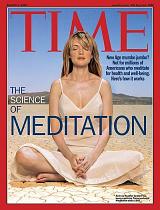To Medicate - or Meditate?
While the value of meditation has been known in Buddhist and Hindu traditions from time immemorial, it is only recently that western medicine has come to acknowledge that meditation can actually improve physical health.
It has been estimated that no less than ten million people in North America today admit to practising some form of meditation.
In the late sixties Dr. Herbert Benson, professor of medicine at Harvard, brought the benefits of meditation to the attention the medical establishment. He studied a group of 36 meditators – measuring heart rate, blood pressure and body temperature while they meditated – and showed that meditation significantly reduced resting heart rate and metabolic rate.
“All that I did,” said Benson, “was simply provide a scientific explanation for techniques that people had been using for thousands of years.” Subsequently, other researchers ‘scientifically’ studied the physiological effects of meditation.
Subsequently John Teasdale in Cambridge demonstrated that meditation helped patients suffering from psychological depression – his research showed meditation halving the relapse rate among his depressed patients. Boosting the immune system Meditation has also been shown to boost the body’s immune system. In a study done at the University of Wisconsin some years ago, two groups of subjects were given flu vaccine.
The group who were meditators had higher levels of antibodies in their blood compared to the non-meditating group – implying that they had better resistance to this disease. Several research studies have established beyond doubt that regular meditation can significantly lower blood pressure.
Says American cardiologist Dr. Dean Ornish, “If you want to prevent build up of cholesterol plaques in your arteries, start meditating.” Today, Ornish is not the only physician recommending meditation to his patients as a method of preventing or controlling chronic diseases such as high blood pressure, cancer, and coronary heart disease. How does meditation produce these therapeutic effects? MRI scans and other means of tracking blood flow and electrical activity in organs of the body have shown that meditation virtually rewires the brain to reduce stress. In effect meditation raises the threshold at which an individual reacts to perceived irritations. If one looks on the brain as being like a pressure cooker set to build up pressure in a confined space and release steam at a particular temperature, what meditating does is reset the boiling point – so that tolerance level is raised and explosions do not take place in the face of external annoyances. In scientific terms, meditation deactivates the Frontal lobe of the brain (which receives and processes sensory information and is responsible for reasoning and emotional awareness) and the Parietal lobe (responsible for orienting a person in space and time). With these two lobes effectively functioning ‘offline’, one’s sense of self is lost, as well as the emotional awareness of outside sensations.
The brain does not shut itself off – it simply blocks irrelevant information going into the frontal and parietal lobes and creating unwanted physiological activity. Benson showed that meditating increased Theta waves (the electrical waves that appear just before one falls asleep) in the brain without the meditating person actually falling asleep. He postulated that this created a sense of calmness, thus allowing a meditator to overcome the body’s natural stress response – the ‘fight or flight’ reaction which takes place when the body perceives an external danger or irritation – and so achieve a calmer, more contented state of mind.
Perhaps this is the essence of Buddhist practice: training oneself to focus on the present and live in the moment without allowing past and future worries to set off the ‘reactionary’ systems that potentiate disease.
Comments
There are 0 comments on this post













